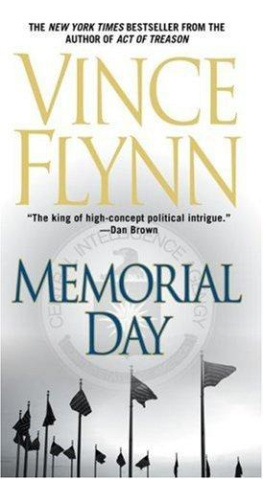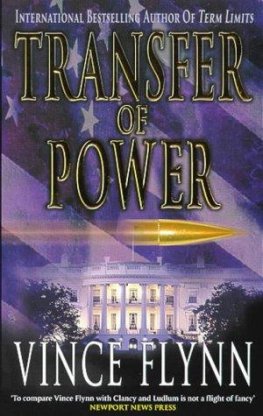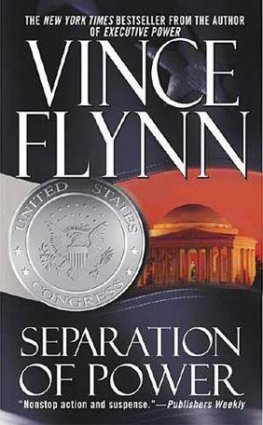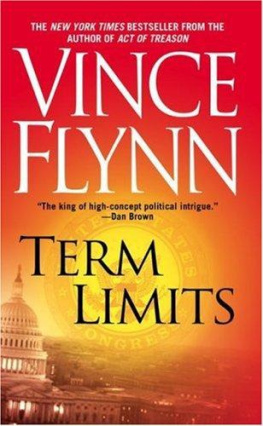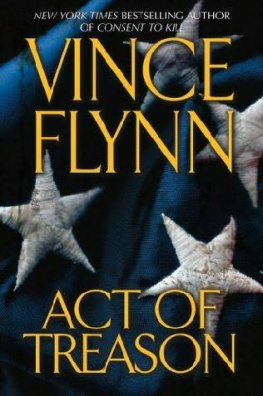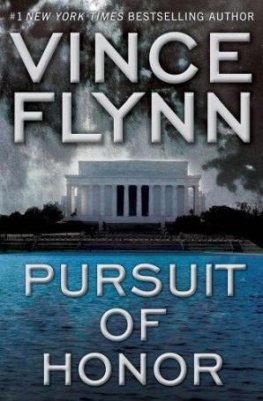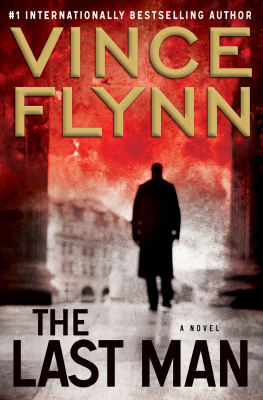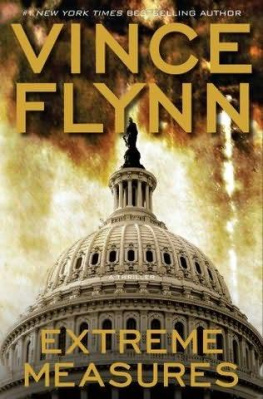
Vince Flynn
Extreme Measures
The ninth book in the Mitch Rapp series
To Robert Richer and
the men and women of the
National Clandestine Service and
National Counterterrorism Center
We sleep soundly in our beds because rough men stand ready in the night to visit violence on those who would do us harm.
WINSTON CHURCHILL
BAGRAM AIR BASE, AFGHANISTAN
MIKE Nash glanced anxiously at his watch and then eyed the twin flat-screen monitors. Both prisoners were sleeping soundly. If all went according to plan, their slumber wouldnt last much longer. The prisoners had been picked up seven days earlier on a routine patrol. At the time, the young GIs had no idea whom they had stumbled upon. That revelation came later, and by accident. The brass at the Bagram Air Base in Afghanistan quickly separated the two men from the other 396 enemy combatants and alerted Washington.
Nash was one of the first people called. The secure phone began ringing at 2:23 in the morning the previous Sunday. The watch officer at the National Counterterrorism Center gave him the news. Nash thanked him, hung up, and contemplated whether or not he should get out of bed and head in to the office. Catching a couple of high-value targets was exciting, but Nash knew from experience that people would be tripping over each other trying to take credit. Having just returned from London, he needed the sleep a hell of a lot more than he needed recognition.
Less than a minute later the phone started up again. This time it was his bosss boss, Irene Kennedy, the director of the CIA. Nash listened without comment for a good twenty seconds and then replied, Im on it. With that, he kissed his wife, got out of bed, threw on some comfortable travel clothes, checked on each of his four kids, grabbed his go-bag, which was always packed, left a brief note by the coffeepot, and was out the door. Given his job, it was all too likely that his family would not be surprised by Nashs absence when they awoke.
Twenty minutes later he arrived at the private airstrip and climbed aboard a fully prepped Gulfstream V. As soon as they were airborne, Nashs thoughts turned to the two prisoners. He didnt need to look at their files. Hed already memorized them. He had been building them for years, each time a new piece of intelligence came in. That was one of Mike Nashs gifts. It didnt matter if it was baseball stats or the details on the whos who of terrorists around the world. If he read it, he could recall it. Nash began to construct his line of questioning. With as much instinct as logic, he laid his traps and anticipated their lies. It would likely take weeks to completely break them, but they would talk. They always did.
Somewhere over the eastern Atlantic he received his first secure message that there was a problem. As the plane raced along at 47,000 feet the drama unfolded via a painful exchange of updates from Langley. Three senators, who had been at the base on a fact-finding mission, had caught wind of the two new detainees and requested to see them. The base commander, through either sheer stupidity or a calculated desire to please those who could advance his career, relented and let the senators sit down with the high-ranking prisoners.
If Nash had been forced to compile a list of the three politicians he most despised, two of these Fact-Finders would have been on it, and the third would have made honorable mention. As chairmen of the Senate Committee on the Judiciary, the Senate Committee on Armed Services, and the Senate Select Committee on Intelligence, they were a powerful group. They also happened to despise the CIA. After their one-hour meeting with the prisoners, the three senators told the base commander in very stark terms that his ass was on the line. The chairman of the Judiciary Committee went one step further and told him if the Geneva Conventions werent followed to the letter she would haul him before her committee and make him answer for his crimes in front of the American people.
The fact that one of the prisoners had earned his stripes with the Taliban by blowing up coalition-built schools with little Afghani children in them seemed to be of little consequence to the chairman of the Judiciary Committee. Neither did she care that the prisoners and their organization were not signatories of the Geneva Conventions. Apparently, she had other priorities. Affording tolerance, respect, and compassion to the bigoted, sadistic, and cold-hearted sounded very noble in principle, but in reality it was a great way to lose a war.
One of the most difficult aspects of Nashs job was dealing with the opportunistic politicians he answered to. These same senators had clamored for action in the months after the attacks on New York and Washington. Behind closed doors they expressed concern that the CIA wasnt being aggressive enough with their interrogation techniques. They pushed for the use of extreme measures, and gave Langley assurances they would be protected. Now, Nash was reminded of the fable about the scorpion who promises the frog he will not sting him if the frog gives him a ride across the river. They were now halfway across the river, and just like in the fable, instincts had taken over, the stinger was out, and they were all on the verge of drowning.
Nash looked at the two prisoners sleeping peacefully in their warm, clean beds. On the left screen was Abu Haggani, a senior Taliban commander in charge of suicide operations in Afghanistan. It was estimated that his attacks had claimed the lives of more than three thousand civilians and another forty-three coalition soldiers. The man was notorious for intentionally targeting women and children in an effort to intimidate his fellow Afghanis from cooperating with coalition forces. The second man was Mohammad al-Haq, the Talibans liaison with al-Qaeda and one of Mullah Omars most trusted aides. While Nash unashamedly relished the thought of inflicting severe pain on Haggani, it was al-Haq who interested him most. The man was an integral link between al-Qaeda and the Taliban. The secrets he held would be invaluable.
Nash had been allowed a maximum of four hours with each man per day for the first three days. Everything was strictly supervised and recorded. No stress positions, no sleep deprivation, no loud music or yelling, no hitting or slapping, no manipulation of diet, and no manipulation of temperature in their cells. Even the mere threat of physical violence had to be approved by lawyers back in Washington.
On Wednesday, Nashs session was ended early when he told al-Haq that he had spoken to General Abdul Rashid Dostum. The former Northern Alliance commander and leader of the Uzbek community was widely known for his hatred of the Taliban. Nash told al-Haq that he had arranged to have him transferred to Dostums custody in the morning. Al-Haq nearly shit a brick over the prospect of being handed over to a man who was every bit as vicious as he and his colleagues. The fear in al-Haqs eyes was obvious. Nash watched him closely as the prisoner searched for a way to forestall the nightmare. Nash had put dozens of men in this situation before. They always looked down at first and then nervously to the left and then the right as they scrambled to come up with something that would save their asses. The truth didnt matter so much at first. Nash just wanted them talking. He could sort out the lies later.
Unfortunately, just as al-Haq was about to start talking, an air force officer burst into the room and stopped the questioning. Nash was put on the phone with the Justice Department lawyers back in D.C. and warned that he had crossed the line. The incident set off a firestorm between the CIA, the White House, the Justice Department, and Senator Barbara Lonsdale, the chairwoman of the Judiciary Committee. While the lawyers argued, Nash began to look for a way to get around the wall rather than over it. That was when he put a call in to Mitch Rapp.
Next page

